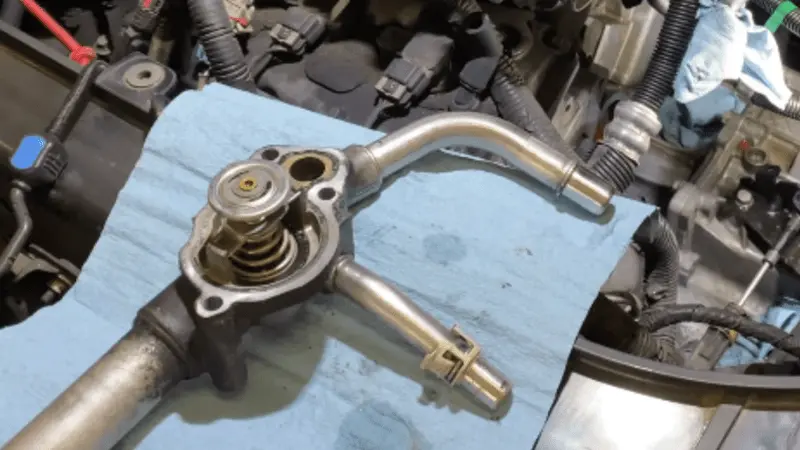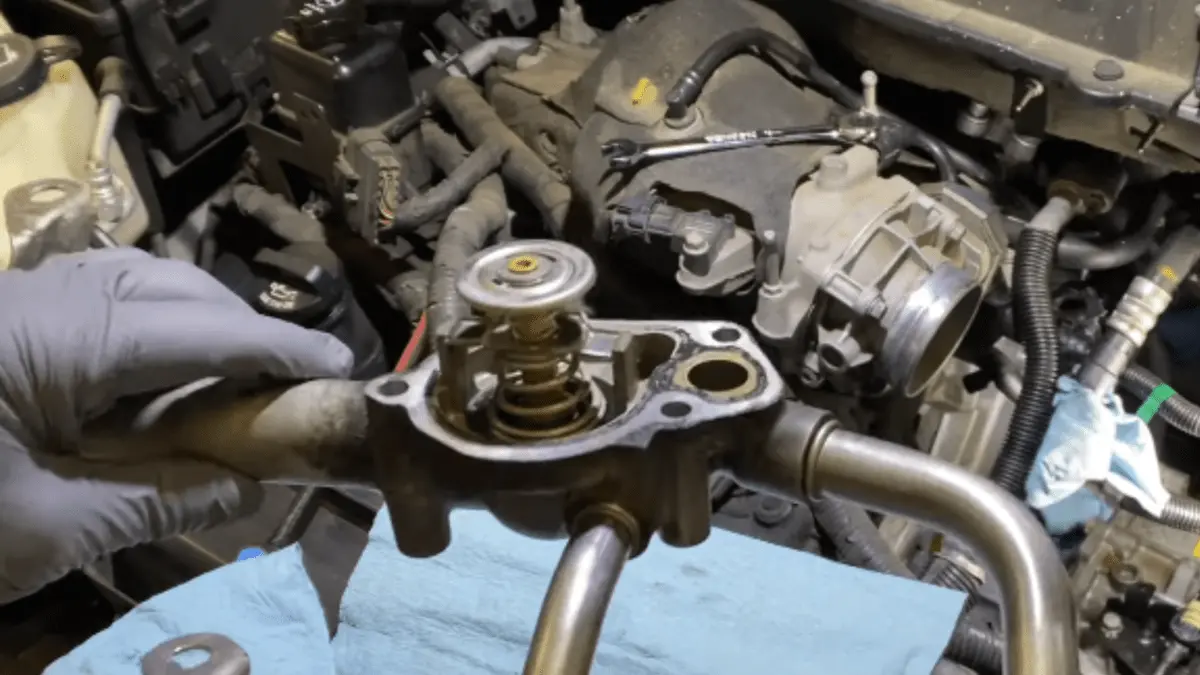Common thermostat problems in a GMC Acadia can manifest in various ways, affecting the vehicle’s cooling system and engine temperature regulation. Some common issues include:
- Stuck Closed: Prevents the flow of coolant, leading to overheating.
- Stuck Open: Permits constant coolant flow, resulting in lower-than-normal engine temperatures and reduced fuel efficiency.
- Inconsistent Temperature: Causes erratic temperature fluctuations, potentially indicated by sudden spikes or drops on the temperature gauge.
- Coolant Leaks: A malfunctioning thermostat can contribute to coolant leaks, impacting the overall efficiency of the cooling system.
- Air Pockets: Trapped air in the cooling system can affect thermostat function, leading to temperature irregularities.
How Can I Tell If The Thermostat In My GMC Acadia Is Bad?

Detecting a faulty thermostat in your GMC Acadia involves observing various signs related to temperature, coolant, sounds, and heater performance. Here are indications that your thermostat may be malfunctioning:
Temperature Fluctuations:
One of the most common signs of a bad thermostat is erratic engine temperature. It suggests a malfunction if your GMC Acadia consistently runs too hot or cold. A thermostat regulates the engine temperature by controlling the flow of coolant. It can get stuck in the closed or open position when it fails, disrupting the normal temperature range.
Coolant Leaks:
Coolant leaks are another red flag for thermostat issues. It may indicate a leak if you notice liquid under your car or the radiator losing coolant. A malfunctioning thermostat can cause pressure buildup, leading to leaks. Regularly check the ground beneath your vehicle for any signs of coolant puddles.
Unusual Sounds and Temperature Changes:
Strange sounds, such as gurgling or bubbling noises, may indicate air pockets in the coolant system due to thermostat problems. Additionally, if the temperature gauge behaves unexpectedly, moving rapidly or inconsistently, it could be a sign of a faulty thermostat disrupting the normal coolant flow.
Heater Problems:
A malfunctioning thermostat can impact the proper functioning of the vehicle’s heater. If you notice that the heater is not producing enough heat or the heat output is inconsistent, it may be linked to a thermostat issue. The thermostat controls the coolant flow to the heater core, and a malfunction can disrupt this process.
Delayed Warm-Up:
If your GMC Acadia takes an unusually long to warm up, it could be due to a malfunctioning thermostat. The thermostat regulates the coolant flow; if stuck open, the engine may take longer to reach the optimal operating temperature.
How Do You Solve The GMC Acadia Thermostat Problems?

Solving thermostat problems in your GMC Acadia involves identifying the underlying issues and taking appropriate measures. Here are six solutions to address common thermostat-related issues:
Diagnosis and Inspection:
Begin by diagnosing the problem. If you notice signs such as erratic temperature fluctuations, coolant leaks, or heater malfunctions, it’s essential to perform a thorough inspection. Check for visible leaks, listen for unusual sounds, and monitor the temperature gauge. If unsure, consult a qualified mechanic for a professional diagnosis.
Thermostat Replacement:
Replacement is often the most effective solution if the thermostat is identified as the culprit. Thermostats can become stuck in the open or closed position, affecting the engine’s temperature regulation. The replacement process involves:
- Draining the coolant.
- Removing the old thermostat.
- Installing a new one.
- Refilling the coolant.
To ensure proper functionality, consider replacing the thermostat with a quality OEM (Original Equipment Manufacturer) or aftermarket equivalent.
RELATED: A Guide to 2017 GMC Acadia Thermostat
Coolant System Flushing:
Over time, the coolant system can accumulate debris and contaminants, impacting thermostat performance. Flushing the coolant system helps remove sediments and ensures optimal coolant flow. It’s recommended to follow the manufacturer’s guidelines for coolant replacement intervals. A clean coolant system promotes efficient thermostat operation and overall engine health.
Bleeding Air from the Cooling System:
Air pockets in the cooling system can hinder proper thermostat function and cause temperature irregularities. After performing maintenance tasks like replacing the thermostat or flushing the coolant, it’s crucial to bleed any trapped air from the system. Follow the vehicle’s specific bleeding procedure or consult a professional mechanic to ensure the cooling system is free of air bubbles.
Addressing Coolant Leaks:
If coolant leaks are identified during the inspection, addressing the leaks is essential. Check for damaged hoses, loose connections, or a malfunctioning radiator cap. Repair or replace any components contributing to the leaks. It’s important to promptly address coolant leaks to prevent engine overheating and thermostat issues.
Regular Maintenance:
Implementing a proactive maintenance routine is key to preventing thermostat problems. Regularly check the coolant level, inspect hoses for wear and tear, and monitor the overall condition of the cooling system. Follow the manufacturer’s recommended maintenance schedule for thermostat inspections and replacements. Timely maintenance can extend the lifespan of the thermostat and reduce the likelihood of unexpected issues.
Why Does My GMC Acadia Get Hot?
If your GMC Acadia is consistently running hot, several common issues may be causing this problem. One frequent culprit is a coolant leak within the system. Leaks can occur from various sources, including the water pump, radiator, hoses, or other components. Reducing the coolant level can compromise the vehicle’s ability to regulate temperature, leading to overheating.
Another potential cause of overheating is a malfunctioning thermostat. The thermostat regulates the flow of coolant through the engine. If stuck in the closed position, it can restrict coolant circulation, increasing engine temperatures.
Additionally, a faulty radiator fan can contribute to overheating. The radiator fan plays a crucial role in dissipating heat from the radiator. If the fan is not functioning correctly, the radiator may not cool efficiently, leading to elevated engine temperatures.
It’s essential to address overheating issues promptly to prevent potential engine damage. If you notice your GMC Acadia running hot, conduct a visual inspection for coolant leaks, check the thermostat’s functionality, and ensure the radiator fan is operating correctly. If you’re uncertain or unable to diagnose the problem, seeking the expertise of a qualified mechanic is advisable to identify and resolve the underlying issue.
FAQs
1. How Do I Know If My GMC Acadia Thermostat Is Stuck Closed?
If your GMC Acadia is overheating, it may be a sign that the thermostat is stuck closed, restricting the coolant flow. Symptoms include the temperature gauge rising rapidly or consistently reading in the high range.
2. What Causes A Thermostat To Get Stuck Open In A GMC Acadia?
A thermostat getting stuck open can be caused by wear and tear over time. This issue prevents the thermostat from closing correctly, allowing a continuous coolant flow. Signs include lower-than-normal engine temperatures and reduced fuel efficiency.
3. Can A Malfunctioning Thermostat Lead To Coolant Leaks In A GMC Acadia?
Yes, a malfunctioning thermostat can contribute to coolant leaks. The pressure changes resulting from thermostat issues may cause leaks in components such as hoses, the water pump, or the radiator.
4. How Can I Check For Air Pockets Related To Thermostat Problems?
To check for air pockets, bleed the air from the cooling system after performing maintenance tasks like thermostat replacement or coolant flushing. Follow the manufacturer’s recommended bleeding procedure or consult a professional mechanic.
5. What should I do if my GMC Acadia shows inconsistent temperature readings?
Inconsistent temperature readings, such as sudden spikes or drops, may indicate a thermostat problem. It’s advisable to have the thermostat inspected and, if necessary, replaced to ensure accurate temperature regulation and prevent engine issues.
How Much Does A New GMC Acadia Thermostat Cost?
A new thermostat for a GMC Acadia typically falls in the range of $688 to $739. This estimate includes the cost of the thermostat part, which is around $493, and the cost of labor, which is usually in the range of $195 to $246. It’s important to note that this estimate does not include taxes, fees, or potential additional repairs to related components.
The final cost may vary based on your location and specific circumstances. To obtain a more accurate estimate tailored to your situation, you can use a Fair Price Estimator, taking into account your location and any additional factors that may impact the overall cost of the thermostat replacement.

Eric L. Friedman is a car expert who has worked on Chevy and GMC trucks for over 10 years. He started AutoYolo to help people fix their own cars. On the blog, he shares easy tips, step-by-step guides, and repair advice to make car problems less stressful and more affordable.

